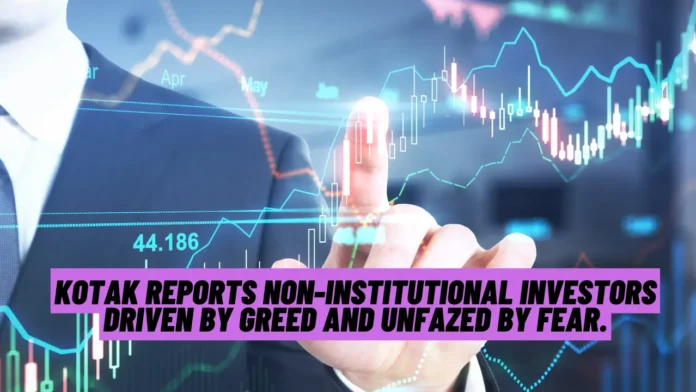In a recent analysis, Kotak Securities has highlighted a significant shift in the behavior of non-institutional investors. According to the brokerage firm, these investors, who typically include retail and high-net-worth individuals, are increasingly driven by greed and appear less affected by market volatility and fear. This emerging trend has important implications for market dynamics and investment strategies.
Key Observations
1. Greed-Driven Investments
Kotak’s analysis suggests that non-institutional investors are prioritizing high returns over traditional risk assessments. This greed-driven approach is evident in the surge of investments in high-risk, high-reward asset classes such as cryptocurrencies, small-cap stocks, and speculative ventures.
2. Resilience to Fear
Unlike previous market cycles where fear and market downturns would typically lead to widespread selling and a flight to safety, non-institutional investors now demonstrate remarkable resilience. Despite significant market corrections, these investors continue to hold or even increase their positions, showing a long-term bullish outlook.
3. Influence of Social Media and Digital Platforms
The proliferation of social media and digital investment platforms has played a pivotal role in shaping the investment behavior of non-institutional investors. Online forums, influencers, and investment apps have created a more informed and interconnected investor community, capable of sharing insights and collectively driving market trends.
4. Shift from Traditional to Modern Investments
There is a noticeable shift from traditional investment vehicles like fixed deposits and government bonds to more modern and dynamic options. Mutual funds, direct equities, and alternative investments are gaining favor as investors seek higher returns and greater market engagement.
Implications for the Market
Market Volatility
The heightened activity of non-institutional investors, driven by greed and seemingly immune to fear, contributes to increased market volatility. Their aggressive trading strategies and quick response to market movements can amplify price swings, making the market more unpredictable.
Sustainability of Bullish Trends
While the resilience of non-institutional investors supports bullish trends, it also raises questions about the sustainability of such market behavior. A prolonged market correction or significant economic downturn could test the limits of their resilience and potentially lead to a sharp market reversal.
Regulatory Attention
Regulators may need to closely monitor the activities of non-institutional investors to ensure market stability and protect against systemic risks. The influence of social media on investment decisions, in particular, warrants scrutiny to prevent misinformation and market manipulation.
Kotak’s Recommendations
Diversification
Kotak advises non-institutional investors to diversify their portfolios to mitigate risk. While high-reward investments are attractive, balancing them with stable, lower-risk assets can provide a safety net against market volatility.
Long-Term Perspective
Maintaining a long-term investment perspective is crucial. While short-term gains are tempting, a disciplined approach focusing on sustainable growth will likely yield better results in the long run.
Financial Education
Increasing financial literacy among non-institutional investors is essential. Understanding market fundamentals, risk management, and the impact of economic indicators can help investors make informed decisions and avoid pitfalls driven by greed.

